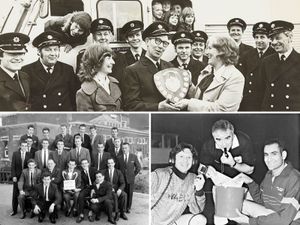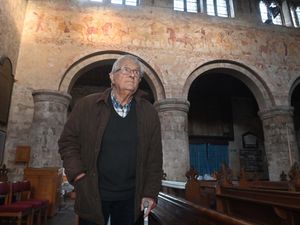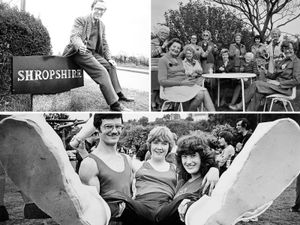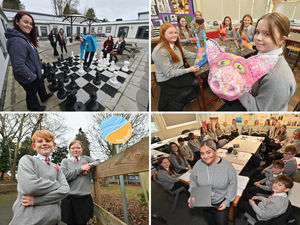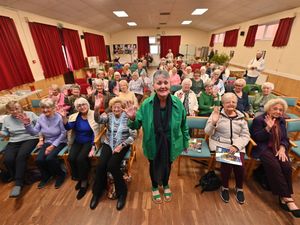Has Graham solved Wolves stagecoach riddle?
They had their golden age in the 19th century before the advent of railways spoiled the fun. So how come some readers have tales of stagecoaches travelling on the streets of Wolverhampton as late as the 1920s?
Graham Robertson raised the question earlier this year.
Graham, from Powys, said he had a 98-year-old friend and neighbour, born and bred in Tettenhall, who recalled that when he was a boy a stagecoach used to come up The Rock at Tettenhall at 6pm daily on its way from London to Holyhead.
That prompted other readers to come forward with recollections of a stagecoach in Wolverhampton around the late 1920s.
Now Graham Taylor of Benthall, near Broseley, has come forward with information that he believes solves the mystery.
It is an advert from May 1928 for 'The Olde Times Stage Coach' which ran daily between Birmingham, Wolverhampton, and Lilleshall Hall.
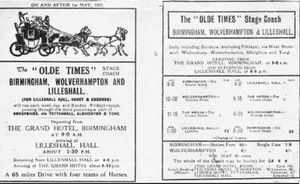
Lilleshall Hall was at that time a tourist attraction. The hall and grounds had been bought in 1927 by enterprising businessman Herbert Ford, who sought to turn it into a moneyspinner with attractions including pleasure gardens, activities like tennis and golf, lunches and teas, and a miniature railway. Its guidebook declared: "See Lilleshall and know the thrill of living."
Ford even advertised that the German airship the Hindenburg would fly over the estate, despite the fact that its route took it nowhere near, and explained the no-show by reading out a self-sent telegram blaming it on bad weather.
The 'Olde Times' stagecoach started the journey from the Grand Hotel in Birmingham at 9am with stops at the Victoria Hotel in Wolverhampton at 10.30am, the Crown Hotel at The Wergs at 11.15am, arriving at Lilleshall Hall at 1.30pm for lunch.
The return journey from Lilleshall started at 4pm. Return fare from Wolverhampton to Lilleshall was six shillings (30p).
The advert described it as "a 65-mile drive with four teams of horses" and said it passed through "the most picturesque part of Shropshire, via Tettenhall, Albrighton, and Tong."
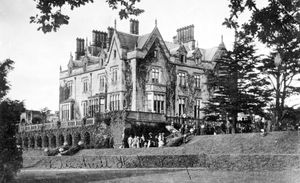
It is not clear how long the Birmingham to Lilleshall Hall stagecoaches were run – Graham thinks it may have been until the 1940s – but in any event the Lilleshall Hall pleasure gardens closed with the outbreak of war.
Graham has a special interest, as he became hooked on traditional carriage driving years ago.
He said: "I have been regular steward at Smith's Lawn, Windsor, for the last 15 or so years, part of a small team that present 120 carriages to Her Majesty on the polo ground where she kindly awards the top seven prizes. I have also been steward at the Carriage Driving Chatsworth Game fair for the last 15 or so years."
Having possibly solved one stagecoach mystery, there is another stagecoach riddle to which the answer has so far eluded Graham.
"There was a more nationally famous coach in Shropshire, called the Shrewsbury Wonder," he said. "I have researched to locate the original Shrewsbury Wonder, but have failed to locate it. I do know a replica was made by a guy from the Midlands 20 years ago."
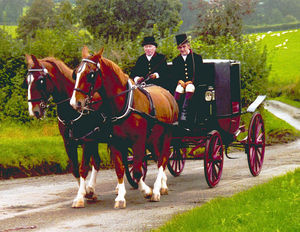
The Shrewsbury Wonder was a stagecoach with a reputation for speed which advertised in the 1830s "to London daily in sixteen hours".
Graham has a 1m x 1.2m painting of the Shrewsbury Wonder painted in acrylics for him a few years ago by an artist in Wales, Jane Ganley, which draws on an original by Victorian artist Cooper Henderson.
As part of his researches he followed up a lead with Birmingham Museum and Art Gallery, which gave him information not about the Shrewsbury Wonder, but an 'Old Times' coach in its collection which ran from Shrewsbury to Chester.
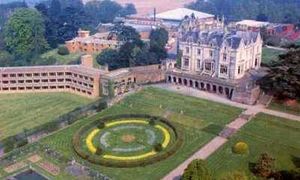
Graham thinks it possible that this stagecoach, which was presented to the museum by Lewis' store in the 1960s, might be the 'Olde Times' coach which made the runs to Lilleshall Hall.
Lewis' had used it for many years to carry Father Christmas through the streets of Birmingham on his annual visit to the store.
During restoration inscriptions were found which disclosed that the coach originally ran from Chester, via Wrexham, Ellesmere and Baschurch to Shrewsbury. They also indicated that it was housed in the Old Times Mews, Phythian Street, Liverpool and was know as the Old Times Coach.

